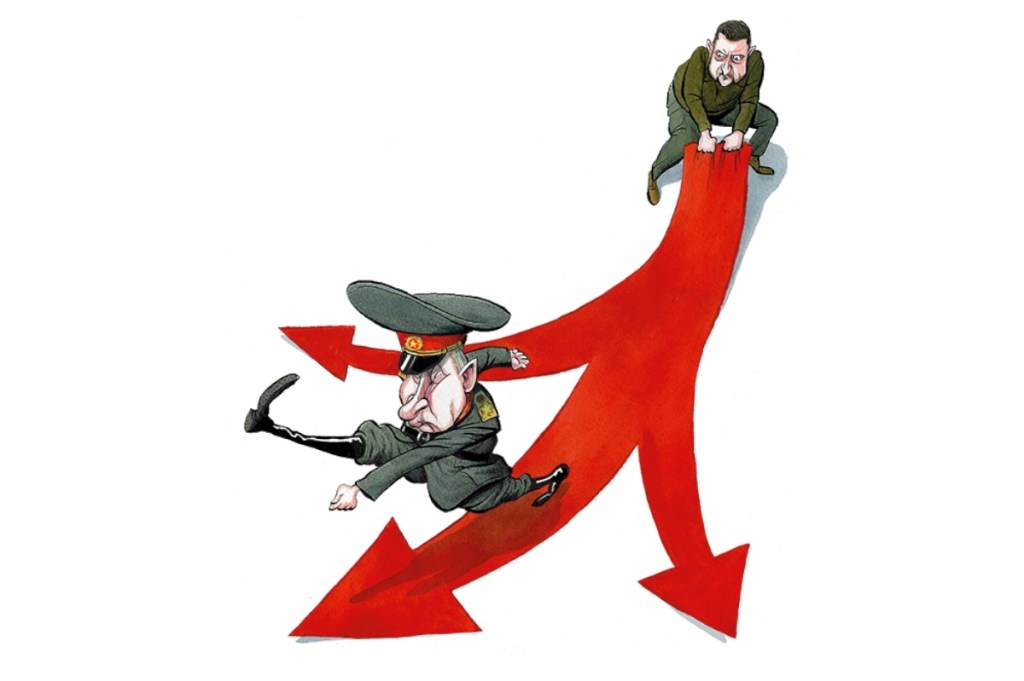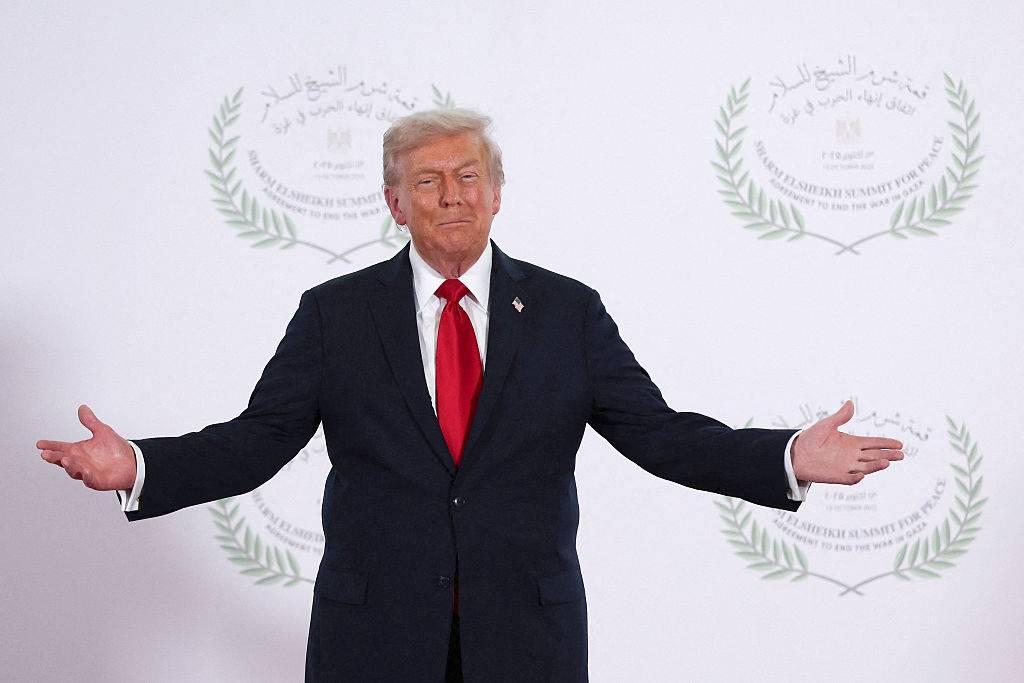Kyiv
The young amputee had a question. We were sitting once again in the rehab center in Kyiv, and I was looking at the same sort of injuries I saw last year: the missing limbs, the cranial scars, the withered hands and feet that no longer obeyed their owners’ commands.
The difference was that Vladimir Putin’s carnage had been inflicted on a new group of Ukrainians — noticeably younger than last year’s victims, and now including a woman. Once again, I shook their hands (where possible) and put my arms around them, and did my best to be reassuring to all, including the young man on the bed, who had lost his left leg up to the hip. “When are you going to let us use the Storm Shadow?,” he asked — amid a general murmur of agreement.
I was positive in my response, or cautiously positive, because it so happened that on that very day the UK delegation had arrived in Washington. If the briefings to the media were accurate, this was perhaps the moment of breakthrough, when the Americans and the British were about to announce that the poor Ukrainians would be able to defend themselves properly against Putin’s glide bombs. We would jointly lift our technological reserve and allow them to use the weapons they already possessed — Storm Shadow and Scalp-EG, its French equivalent, and the American ATACMS systems — in the way they were supposed to work.
I was confident that these permissions would be forthcoming because I could not imagine why else the UK would have bothered to stage the meeting. Why otherwise did Sir Keir Starmer go to the White House, togged up in his Waheed Alli-funded suit and specs? What on earth was Sue Gray doing there? Enforcing the rules on “propriety and ethics?” Huh.
Now the US-UK talks have ended in failure — at least for the moment. What the hell are we supposed to tell the Ukrainians? The days are ticking by. The killing goes on. What do we say to all those who continue to suffer loss and mutilation at the hands of Putin?
What more have these people got to do to show the rest of us their fighting spirit and their ability to win? Look at what they have achieved in the Kursk region, the audacity of their lunge on to Russian land, taking more than 500 square miles and 100 villages, creating a strategic dilemma for Putin that will only intensify as the autumn rains begin and the fighting season draws to a close.
Then think what more they could have done, and faster, to turn the tables on Putin, if only we had not been dilatory with our help. Then ask yourself the corollary question: how many Ukrainian lives and limbs could have been spared if we had done the right thing, or at least done it earlier. When you look at the maimed bodies of these soldiers, you are looking at a ghastly reproach to our delay.
So why are we doing it again? What’s the hold-up with Storm Shadow and the permissions to use them against Putin’s bases within Russia? Can we please all stop babbling this tired old rubbish about “escalation” and the so-called fear of provoking Putin. That argument has been mounted at every stage in the past three years, and at every stage it has been disproved by events.
I remember getting warnings from the UK system about the risk of “escalation” when we sent the NLAW missiles, just before Putin invaded — though in fact the weapons were of vital assistance to the Ukrainians in immobilizing Russian tanks. People made the very argument against sending western tanks, against sending planes, against sending missile systems of all kinds; and yet the outcome was always the same.
Putin’s bluster and saber-rattling turned out to be nonsense because in reality he is the one who fears escalation. Indeed, one of the very reasons the Ukrainians have been able to mount their astonishing operation in Kursk is that after more than six months of agonizing delay in Congress, the $60 billion of US “supplemental” assistance is finally getting through.
If you are truly worried about “escalation,” then imagine what happens if Ukraine loses this war — because that is when things really would begin to escalate. Ukraine won’t lose but if it did, we would have the risk of escalation across the whole periphery of the former Soviet empire, including the border with Poland, wherever Putin thought that aggression would pay off.
We would probably see escalation in the South China seas and in the Middle East. We would see a general escalation of global tension and violence because a Ukrainian defeat, and a victory for Putin, would be not only a tragedy for a young, brave and beautiful country; it would mean the global collapse of western credibility.
It would mean the demolition of all our claims to be willing to stand up for “freedom” or “democracy.” Above all, a defeat for Ukraine would be — let us not mince our words — a catastrophic defeat for NATO, the explosion of the aura of NATO invincibility that has helped keep us — the British — safe for the past eighty years. It cannot and must not happen. So for heaven’s sake let us snap out of this trance-like state and stop muttering about “escalation” as an excuse for vacillation.
We need to get serious and to get real, and the first step to sanity is to understand that there is no honorable compromise to be made with Putin. We must abandon any idea that the Ukrainians will do a deal. They won’t. They won’t trade land for peace. They have fought for too long, and they have suffered too much. Their hatred for Putin — and now, I am afraid, the Russian aggressor as a whole — burns with such an incandescence that no Ukrainian leader could do such a deal and remain in office. Yes, the Ukrainians are tired, and of course there are many who want the war to be over. But their will to fight is undiminished, and it feels to me that the country would collapse into anarchy and civil war rather than submit to partition.
We in the West would be mad to try to impose that outcome. There is only one alternative, and it happens to be the morally right course of action. That is to pursue a three-fold plan for Ukrainian victory of the kind that I believe President Volodymyr Zelensky will outline in the US in the next few days.
We need to stop the pathetic game of grandmother’s footsteps with Putin. We need to end the delays. We need to drop the mantra that we are with Ukraine “for as long as it takes” (which now makes Ukrainians groan). We need to get it done and get it won.
We need to show that we are serious, first by giving the Ukrainians the right to use the weapons they already possess. It is mad (and cruel) to insist that they try to protect themselves against bombardment with one hand tied behind their backs. Second, we need to produce a package of loans on the scale of Lend-Lease: half a trillion dollars, as suggested by former US secretary of state Mike Pompeo, or even a trillion.
Remember, in the long term a peaceful and prosperous Ukraine will amply repay this confidence, just as Britain faithfully repaid Lend-Lease until the premiership of Tony Blair. In the short term, a giant Lend-Lease package will send the message to the Kremlin that we are going to out-gun you financially and back Ukraine on a scale you cannot hope to match.
Third and most important of all, we need to end the ambiguity that has dogged Ukraine since the end of the Cold War, and give final institutional expression to the destiny the Ukrainian people have chosen. We need to get Ukraine into NATO now, and I mean now.
There is a way of doing this. We could invite Ukraine to join before the war is even over. That is because we could extend the Article 5 security guarantee to all the Ukrainian territory currently controlled by Ukraine (or at the end of this fighting season), while reaffirming the absolute right of the Ukrainians to the whole of their 1991 nation. We could protect most of Ukraine, while simultaneously supporting the Ukrainian right to recapture the rest. There is plenty of scope within the NATO treaty to do this. See Article 6, which specifies that countries can be members even if the security guarantee does not apply to all of their internationally recognized territories.
We should do this in the next few months because this is the single biggest step we can take to bring this hideous war to an end. By getting Ukraine into NATO, we would send the crucial message to the Kremlin, the one Russians really need to hear.
The message is: that’s it. It’s over. You don’t have an empire any more. You don’t have a “near abroad” or a “sphere of influence.” You don’t have the right to tell the Ukrainians what to do, any more than we British have the right to tell our former colonies what to do. It is time for Putin to understand that Russia can have a happy and glorious future, but that like Rome and like Britain, the Russians have decisively joined the ranks of the post-imperial powers, and a good thing, too.
Can anything like this happen? It certainly can, but it depends on us, on NATO, and above all on America. It means that we would all have to commit to the defense of that Ukrainian territory; and of course that will mean anxiety and resistance. Pentagon strategists will point at the map, the sheer size of Ukraine, and they will dwell on the risk and the expense. Well, as I say, I believe a peaceful Ukraine will be in a position to meet the expense. As for the risk, it is all the other way. The risk is that we continue with the ambiguity and indecision over the future of Ukraine that has led to the worst war in Europe in my lifetime. To adapt St. Paul, NATO membership for Ukraine will bring faith, hope and clarity, and the greatest of these is clarity. NATO membership means clarity on borders, clarity on governance, clarity for Russia and Ukraine alike; and with clarity comes peace and stability.
Would any US president do it? Would Donald Trump do it? I have argued many times that the Republican candidate has been far better on foreign policy questions than his detractors say. Trump was bolder, tougher and more decisive than his Democrat counterparts on Syria, Iran and Ukraine itself, where he was the first to ship anti-tank weapons. Yes, I do believe he has the strength to pull it off, and to end the war this way. I also believe, frankly, that there is no alternative.
If we want peace, then we must put the Ukrainians in the strongest possible position, and this is how to do it. It was that great Republican president Ronald Reagan who called the Soviet Union an “evil empire,” and I cannot believe there is any US president, Republican or otherwise, who will allow Putin to rebuild it.
This article was originally published in The Spectator’s UK magazine. Subscribe to the World edition here.


























Leave a Reply